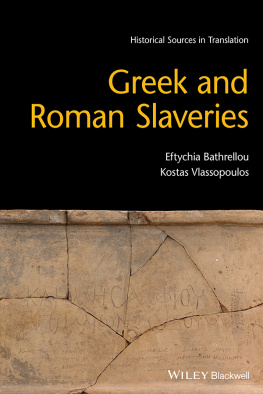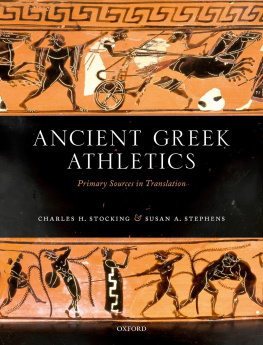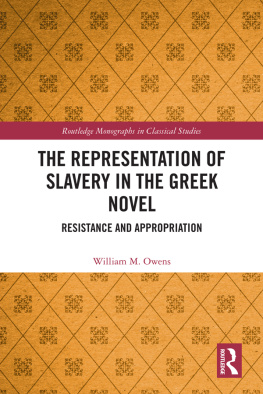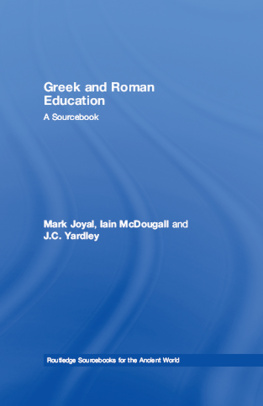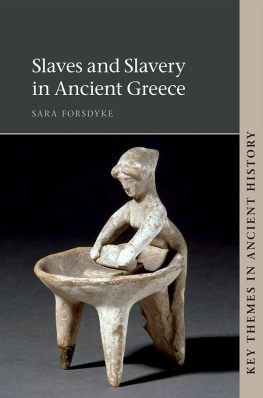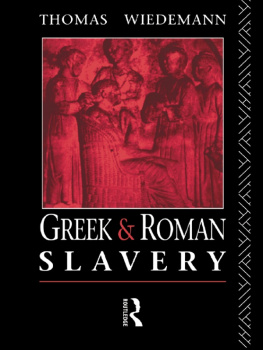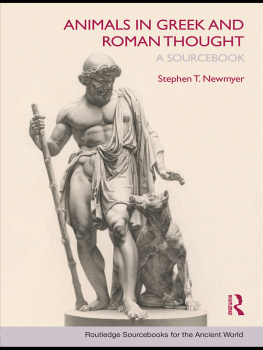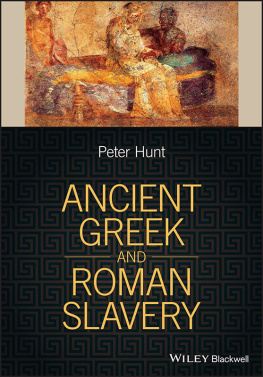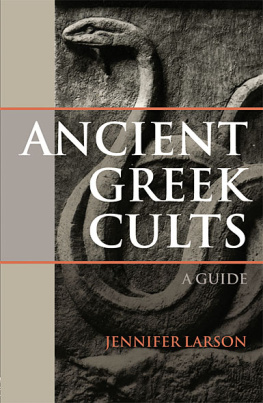Blackwell Sourcebooks in Ancient History
This series presents readers with new translations of the raw material of ancient history. It provides direct access to the ancient world, from wars and power politics to daily life and entertainment, allowing readers to discover the extraordinary diversity of ancient societies.
Published
The Ancient Near East
Edited by Mark W. Chavalas
The Roman Games
Alison Futrell
Alexander the Great
Waldemar Heckel and J. C. Yardley
The Hellenistic Period
Roger Bagnall and Peter Derow
Ancient Greek Religion
Emily Kearns
Ancient Greece from Homer to Alexander
Joseph Roisman and J. C. Yardley
Early Rome: Myth and Society
Jaclyn Neel
Greek and Roman Slaveries
Eftychia Bathrellou and Kostas Vlassopoulos
In Preparation
Successors to Alexander the Great
Pat Wheatley and Timothy Howe
Greek and Roman Slaveries
Eftychia Bathrellou
University of Lisbon
Lisbon, Portugal
Kostas Vlassopoulos
University of Crete
Rethymno, Greece
This edition first published 2022
2022 John Wiley & Sons, Inc.
All rights reserved. No part of this publication may be reproduced, stored in a retrieval system, or transmitted, in any form or by any means, electronic, mechanical, photocopying, recording or otherwise, except as permitted by law. Advice on how to obtain permission to reuse material from this title is available at http://www.wiley.com/go/permissions.
The right of Eftychia Bathrellou and Kostas Vlassopoulos to be identified as the authors of this work has been asserted in accordance with law.
Registered Office
John Wiley & Sons, Inc., 111 River Street, Hoboken, NJ 07030, USA
Editorial Office
111 River Street, Hoboken, NJ 07030, USA
For details of our global editorial offices, customer services, and more information about Wiley products visit us at www.wiley.com.
Wiley also publishes its books in a variety of electronic formats and by print-on-demand. Some content that appears in standard print versions of this book may not be available in other formats.
Limit of Liability/Disclaimer of Warranty
While the publisher and authors have used their best efforts in preparing this work, they make no representations or warranties with respect to the accuracy or completeness of the contents of this work and specifically disclaim all warranties, including without limitation any implied warranties of merchantability or fitness for a particular purpose. No warranty may be created or extended by sales representatives, written sales materials or promotional statements for this work. The fact that an organization, website, or product is referred to in this work as a citation and/or potential source of further information does not mean that the publisher and authors endorse the information or services the organization, website, or product may provide or recommendations it may make. This work is sold with the understanding that the publisher is not engaged in rendering professional services. The advice and strategies contained herein may not be suitable for your situation. You should consult with a specialist where appropriate. Further, readers should be aware that websites listed in this work may have changed or disappeared between when this work was written and when it is read. Neither the publisher nor authors shall be liable for any loss of profit or any other commercial damages, including but not limited to special, incidental, consequential, or other damages.
Library of Congress Cataloging-in-Publication Data
Names: Bathrellou, Eftychia, author. | Vlassopoulos, Kostas, 1977- author.
Title: Greek and Roman slaveries / Eftychia Bathrellou, Kostas Vlassopoulos.
Description: Hoboken, NJ : John Wiley & Sons, 2022. | Includes bibliographical references and index.
Identifiers: LCCN 2021021140 | ISBN 9781118969298 (paperback) | ISBN 9781118969328 (pdf) | ISBN 9781118969335 (epub)
Subjects: LCSH: Slavery--Rome--History. | Slavery--Greece--History.
Classification: LCC HT863 .B38 2022 | DDC 306.3/6209495--dc23
LC record available at https://lccn.loc.gov/2021021140
Cover image: Museo Archeologico Nazionale di Reggio Calabria
Cover design by Wiley
Set in 10/13pt StoneSerif by Integra Software Services Pvt. Ltd, Pondicherry, India
To the memory of
Gerasimos Vlassopoulos (19492018),
Stavros Bathrellos (19502016),
and Metaxia Anaplioti (19372018),
who encouraged us to keep walking in the paths we had taken,
whatever the odds.
List of Figures and Maps
Figures
Front cover: Inscribed terracotta tile, first century BCE/first century ce: Museo Archeologico Nazionale di Reggio Calabria; su concessione del Ministero della Cultura n. 8 del 24/3/2021 Museo Archeologico Nazionale di Reggio Calabria.
Map
Note to the Reader
Editions of Greek and Latin literary texts, inscriptions, and papyri
All translations are our own. Unless otherwise specified, we have translated what is considered the standard edition of the Greek and Latin literary texts. For papyri, we have translated the text appearing in papyri.info, while for inscriptions we have translated the text indicated in their reference number unless otherwise specified.
Signs used in the book
*** indicates that something of the original Greek or Latin text has been lost in transmission.
indicates that the transmitted Greek or Latin text is problematic, and the exact wording of the original cannot be recovered.
[] indicates that (i) text has been omitted by us or (ii) text has been lost through damage to the inscription or papyrus.
[aaa] lost text restored by the modern editor.
text erroneously omitted in the transmitted Greek or Latin text but added by the modern editor.
(aaa) text added by us to facilitate understanding.
Names of persons, places, and peoples
We have used assimilated English forms of names of persons, places, and peoples whenever we judged them recognizable relatively widely (e.g. Attica, Rhodes, Lacedaemonians, the philosopher Socrates).
Names of ancient authors: We have followed the style of the Oxford Classical Dictionary both for the authors of the sources and for authors mentioned in them.
Other persons names: In translations of Latin sources, we have kept the Latin form of persons names, whatever the names origin. With one exception (source 12.2), in translations of Greek sources, we have transliterated peoples names of Greek origin but used the Latin form of Latin names.
Place names: We have used Greek transliterations of toponyms in the Eastern Mediterranean and Latin forms of toponyms in the Western Mediterranean, the northern Balkans, and northern Europe.
Names of peoples: For the names roots, we have followed the same policy as with place names, so that the people can be connected with the corresponding toponym relatively easily. But we have tended to use assimilated English endings throughout (e.g. Achaeans, Kilikians, Dacians).
Acknowledgements
This book has had a very long gestation, from the early 2010s, when it was conceived, until its final delivery almost a decade later. We would like to thank Wiley Blackwell and its staff for their original invitation to contribute this volume to the Blackwell Sourcebooks in Ancient History series, as well as for their patience over the years; we hope that the final product has made the long journey worth its salt!Much of the final work for this book was done in lockdown conditions because of the COVID-19 pandemic, and we are grateful to colleagues and friends who gave us access to material we would not otherwise be able to consult in such circumstances. We would particularly like to thank Angelos Chaniotis, Eleanor Dickey, Kyriaki Konstantinidou, and the staff at the Library of the Faculty of Letters at the University of Lisbon for providing us with materials and going out of their way to help. Kostas Vlassopoulos would like to thank the Department of History and Archaeology, University of Crete, for the research leave in spring 2020, alongside with the Center of Hellenic Studies in Washington, DC, for the Spring Fellowship during the same period; in combination, they provided the time and facilities for completing this volume. We would also like to express our gratitude to the following scholars and friends for their help and generosity in terms of finding the texts and images that appear in this volume: Elizabeth Fentress, Harriet Flower, Pavlina Karanastasi, Stephanie Maillot, Monica Trmper, Mantha Zarmakoupi, and Gabriel Zuchtriegel. We would also like to thank the British Museum, the Leiden Rijksmuseum, the Museo Archeologico Nazionale di Reggio Calabria, the National Archaeological Museum of Athens, and the Parco Archeologico di Pompeii for permission to reproduce the images included in this volume. Special thanks also go to Margherita Maria Di Nino for her help in our communication with Italian cultural authorities and to Timothy Duff and Fotini Hadjittofi, who always found time to discuss translation issues with us; Timothy Duff also read and improved large parts of our text, for which we are very grateful. Needless to add, all remaining errors and other shortcomings are our own responsibility.

